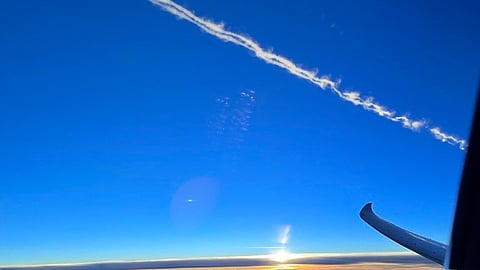Etihad Teams Up with SATAVIA to Prevent Contrails on NetZero Flight
Etihad Airways, the national carrier of the United Arab Emirates, is implementing contrail prevention on a special NetZero flight during the COP27 event as part of its continuing partnership with SATAVIA.
The airline is set to operate a dedicated NetZero flight EY130 from Washington Dulles Airport to Abu Dhabi on Sunday 13 November, combining SATAVIA contrail prevention with sustainable aviation fuel (SAF), alongside other operational efficiencies, to demonstrate the potential for net-zero commercial aviation using current technology.
The flight is the latest in Etihad’s programme of ecoFlights carried out over the past two years, and follows the EY20 Sustainable Flight Etihad operated from London Heathrow to Abu Dhabi last year, reducing overall climate impact by 72%.
Building on Etihad’s weekly contrail prevention exercises with SATAVIA, the flight will be the first Etihad transatlantic crossing to actively manage non-CO2 climate effects from contrail formation, tackling a sustainability challenge responsible for up to 60% of aviation’s climate footprint.
Etihad and Cepsa Join Forces to Decarbonise Air Transport
Mariam Alqubaisi, Etihad’s Head of Sustainability & Business Excellence, said: “The Etihad/SATAVIA collaboration demonstrates the possibility of dramatic sustainability advances in day-to-day commercial operations.
“In 2022 alone, SATAVIA technology has enabled us to eliminate over 6,500 tonnes of carbon dioxide equivalent climate impact. We are delighted to extend this partnership on this transatlantic flight during COP27, tackling aviation’s non-CO2 impacts with industry-leading technical innovation.”
Aircraft-generated condensation trails, or contrails, cause surface warming responsible for up to two-thirds of aviation’s climate impact, significantly outweighing direct CO2 emissions from aircraft engines.
Transatlantic routes such as Washington to Abu Dhabi typically combine high air traffic density with atmospheric conditions that can lead to significant non-CO2 climate impact. In winter operations, cool and moist conditions frequently lead to strongly warming contrails.
In addition to enabling contrail prevention in day-to-day flight operations, SATAVIA conducts post-flight climate impact analysis for conversion into future carbon credits, with an initial world-first trade by auction planned with AirCarbon Exchange in December 2022.
SATAVIA CEO, Dr Adam Durant said: “Our contrail platform DECISIONX:NETZERO supports smarter, greener aviation.
“By implementing minimal changes to a small percentage of flights, eco-conscious operators like Etihad can eliminate the majority of their non-CO2 climate footprint with essentially no impact on day-to-day operations and on shorter timescales than other green aviation interventions.
"For transatlantic operations, up to 80 per cent of contrail climate impact can be avoided by rerouting just over 10 per cent of flights.”
The Greenliner flight will combine contrail prevention with SAF Book & Claim via Etihad partners World Energy, with purchased SAF delivered into the Los Angeles International Airport (LAX) fuel system for use by other flights.
The additional cost will be mitigated by subsidies, by Etihad’s Corporate Conscious Choices programme, and by trading SATAVIA-generated future carbon credits.
Alqubaisi said: “The aviation industry can’t achieve climate-neutral operations without managing non-CO2 effects. We look forward to our continued collaboration with SATAVIA, expanding the art of the possible and accelerating progress towards climate-neutral aviation.”
Read More: Etihad Cargo Doubles Cool Storage at Abu Dhabi Airport Cargo Village


